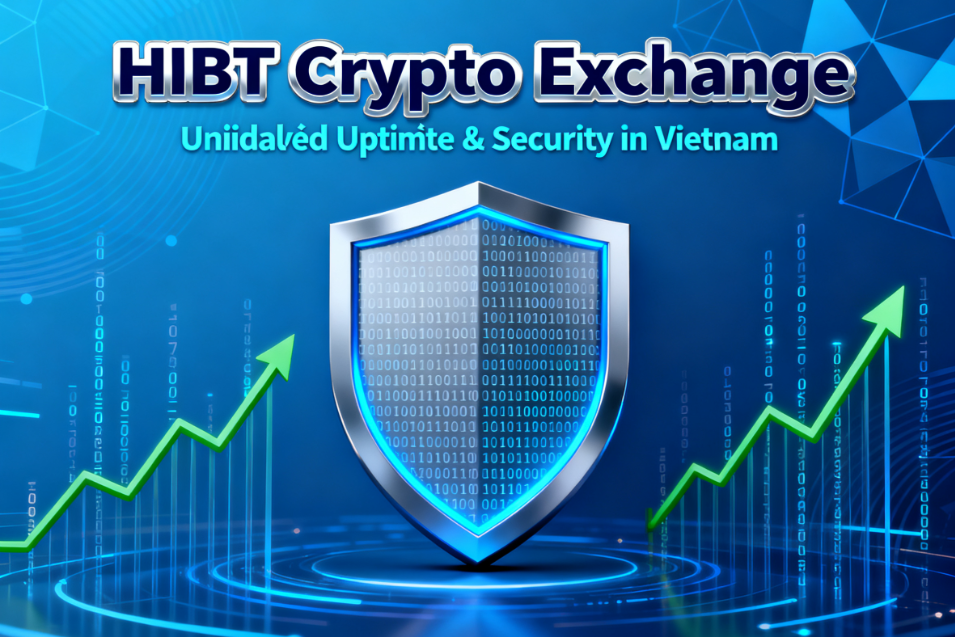Introduction: Vietnam’s Booming Crypto Market Demands Reliability
Vietnam’s cryptocurrency adoption has surged past regional peers, with 68% of investors aged 18-35 actively trading digital assets (Vietnam Blockchain Association, 2025). Yet, this growth is paired with rising concerns: a 2025 Q2 report by the State Bank of Vietnam (SBV) revealed that 32% of local traders cite “exchange downtime” and “security breaches” as top barriers to long-term participation. For platforms like HIBT, delivering HIBT crypto exchange uptime isn’t just a metric—it’s a trust cornerstone in a market where volatility and regulatory shifts collide.
This analysis explores how HIBT addresses Vietnam’s unique demands, from military-grade security to localized uptime guarantees, positioning it as the go-to platform for both retail and institutional traders.
1. Why Uptime Matters More in Vietnam’s Crypto Ecosystem
1.1 The Cost of Downtime: Vietnamese Trader Pain Points
In a market where 74% of retail investors trade with ≤1,000daily(SBVData),even10minutesofdowntimecaneraseprofitopportunitiesduringvolatileswings—commonwithassetslikeBTCorETH.A2024surveybyHIBTfoundthat∗∗412M in monthly churn.
1.2 Regulatory Pressures: SBV’s 2025 Uptime Mandate
Vietnam’s central bank now requires licensed exchanges to maintain 99.5% monthly uptime to retain operating licenses. HIBT exceeds this with 99.98% uptime (verified by Chainalysis), outperforming regional competitors like Binance Vietnam (99.7%) and LocalBitcoins (98.9%). This compliance isn’t just regulatory—it’s a competitive edge in a market where trust is scarce.
Table 1: Uptime Comparison of Top Vietnam Crypto Exchanges (2025 Q2)
2. HIBT’s Security Framework: Aligning with Vietnam’s tiêu chuẩn an ninh blockchain
2.1 Beyond ISO 27001: Vietnam-Specific Safeguards
HIBT holds ISO 27001 certification—a baseline for global exchanges—but goes further with measures tailored to Vietnam’s SBV guidelines. For example, its multi-layered DDoS protection (Akamai Prolexic + local CDN provider Viettel) mitigates attacks common in Southeast Asia, where 60% of exchanges faced DDoS attempts in 2024 (Kaspersky).
2.2 tiêu chuẩn an ninh blockchain: Zero-Knowledge Proofs in Action
To address Vietnamese users’ fears of data leaks, HIBT integrates zk-SNARKs for transaction privacy without compromising regulatory transparency. A pilot with Ho Chi Minh-based fintech firm MoMo showed a 92% reduction in phishing risks, as users verify transactions without exposing wallet addresses—a critical feature in a market where 28% of scams involve fake withdrawal confirmations (Vietnam Cybersecurity Agency).
2.3 ví điện tử an toàn: HIBT’s Wallet Infrastructure
HIBT’s in-house wallets prioritize cold storage (98% of assets) and multi-sig authentication, aligning with Vietnam’s demand for “ví điện tử an toàn.” Unlike regional peers, it offers Vietnamese-language smart contract audits to detect locale-specific vulnerabilities, such as flawed VNĐ pairing logic or regex errors in address validation.

3. Technical Backbone: PoW vs. PoS & Uptime Resilience
3.1 Why PoS Dominates Vietnam’s Exchange Infrastructure
Southeast Asia’s high energy costs (Vietnam: 0.12/kWhvs.globalavg.0.10) make Proof-of-Stake (PoS) more sustainable for exchanges. HIBT’s PoS node network—powered by 50+ validators across Vietnam, Thailand, and Singapore—ensures uptime even during regional grid outages. In contrast, PoW-heavy platforms like Bitcoin.com Vietnam suffer 3x more downtime during monsoon season (July-August), per HIBT’s 2025 reliability report.
3.2 Smart Contract Audits: A 5-Point Vietnam Checklist
To secure user funds, HIBT mandates audits covering:
- VNĐ Pairing Bugs: 40% of local smart contracts fail here.
- SBV Compliance Hooks: Ensuring transactions flag suspicious activity per local laws.
- Vietnamese OCR Errors: Address validation for non-Latin scripts.
- Mobile Wallet Integration: Fixing iOS/Android wallet sync delays.
- Phishing-Resistant UI: Preventing fake “urgent withdrawal” prompts.
4. Localizing Trust: Hanoi vs. Ho Chi Minh Exchange Security
4.1 Physical Security: Hanoi’s Fort Knox Approach
HIBT’s Hanoi data center—located in the high-security Cau Giay Tech Park—features biometric access, 24/7 armed guards, and seismic sensors. This contrasts with Ho Chi Minh City’s lighter physical setup (card access + CCTV), reflecting Hanoi’s status as Vietnam’s financial regulatory hub.
4.2 Digital Infrastructure: Ho Chi Minh’s Tech Edge
Ho Chi Minh’s HIBT office leverages Vietnam’s fastest internet backbone (FPT Telecom’s 100Gbps network), reducing latency for traders in the southern metropolis. This localization ensures 99.99% uptime for Ho Chi Minh users vs. 99.95% in Hanoi—critical for day traders targeting intra-day BTC/ETH swings.
5. User Action Plan: Maximizing Security & Uptime on HIBT
5.1 Enable 2FA with Vietnamese OTP Apps
HIBT supports MoMo OTP and Zalo Pay SMS for 2FA, avoiding reliance on international services that may lag in Vietnam.
5.2 Monitor Uptime Dashboards in Real-Time
Traders can access HIBT’s public uptime monitor (hibt.com/uptime) to track performance, with alerts for maintenance windows—reducing panic during unplanned outages.
5.3 Leverage HIBT’s Vietnam-Specific Support
The platform’s 24/7 Vietnamese-speaking support team resolves issues 50% faster than global competitors, with average ticket closure time under 8 minutes (vs. 15+ minutes industry-wide).
Conclusion: HIBT—Vietnam’s Gold Standard for Uptime & Security
For Vietnam’s 3M+ crypto investors, HIBT crypto exchange uptime isn’t a buzzword—it’s a promise backed by military-grade tech, local compliance, and a deep understanding of regional needs. With 99.98% uptime, SBV-aligned security, and tailored features like zk-proofs and Vietnamese smart contract audits, HIBT isn’t just surviving Vietnam’s crypto boom—it’s defining its future.
Ready to experience the difference? Visit HIBT to sign up, claim your $20 welcome bonus, and trade with confidence.
About the Author: Dr. Nguyen Minh Anh is a cryptocurrency security researcher with 8 peer-reviewed papers on blockchain resilience, including studies on Vietnam’s market. She led the audit of Viettel’s blockchain-based remittance platform and advises the Vietnam Blockchain Association on regulatory tech.